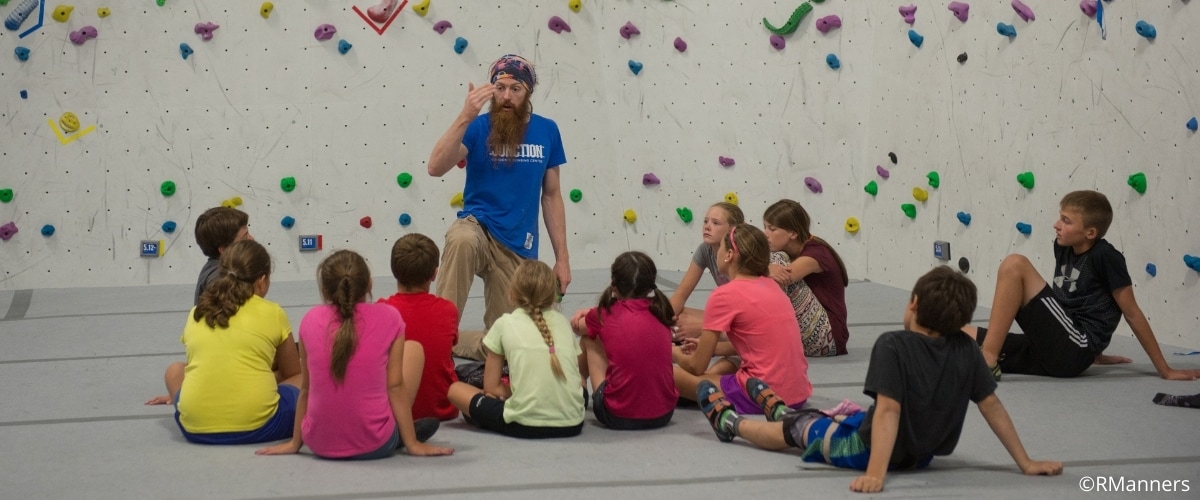Managing Youth Behavior Issues in the Gym

Behavior management is a challenging skill to develop for coaches working with youth. It takes consistent practice and requires the coach to evolve along with their groups.
Effective group management for youth teams includes a variety of tools that, when implemented appropriately, keeps the group engaged, focused, and on track toward their goals. Effective group management also includes proactive behavior management strategies such as positive reinforcement, effective grouping and pairing activities, and flexibility.
At the Headwall Group, we spend a lot of time working with instructors and coaches of youth climbing programs. We work to improve their group management techniques so that they can ensure climbers are getting the most out of their practices, and to avoid running into behavior issues with young climbers. We’ve seen two common challenges to managing challenging behavioral situations – time and staff resources – since those are usually in short supply.
The best approach is proactive behavior management. However, even if a coach has extremely effective group management skills, it is inevitable that they will occasionally experience behavior challenges with a team member or group.
In these instances, it is important that the coach and program as a whole are equipped with some knowledge and tools.
During a climbing practice, disruptive behavior can have the potential to derail a lesson, cause a distraction to the other climbers, create frustration or even pose serious safety concerns. When a climber is exhibiting disruptive behavior despite proactive strategies from the coach, it is important to address them quickly, confidently, and consistently.
WHAT IS A CHALLENGING BEHAVIOR?
Some common examples of disruptive behavior include talking when the coach is talking, not following directions, not participating, exclusive social cliques, or unsafe behavior like running under other climbers in the bouldering area. These behaviors can range from fairly innocuous to very serious. The majority seem to fall somewhere in the middle, but all of them stand to have a negative impact on a coach’s ability to facilitate a quality program.
For the purposes of this article, we will be addressing behaviors that crop up despite proactive group management and distract the group from their primary goals.
MANAGING EXPECTATIONS
It is important for youth programs to have clear behavior policies and guidelines for climbers, families, and coaches to reference. Then, any instances of challenging behaviors can be looked at in the context of these guidelines, which make it easier for coaches to address the situation and apply the appropriate intervention justly and efficiently.
One recommendation: programs should tie their policy and behavior guidelines into their program culture by using its core values as the framework.
Doing this allows the coach to help climbers draw parallels between their own behavior and the expectations of the program.
Further, it creates a culture in which climbers do not have to guess what acceptable behavior looks like, and hold each other accountable. Whenever behavior issues arise, the coach has a built-in structure for guiding difficult discussions.
Example: Two climbers are teasing another climber for not completing a route. If one of the program’s core values is teamwork, the coach can point to that value when discussing the specific behavior of teasing and present alternative behaviors that fulfill that value.
About the Headwall Group
 The Headwall Group distills the lessons learned as educators and leaders working in dynamic and high risk environments and brings them to youth-serving organizations. The Headwall group provides trainings, consultation, and curriculum development services that are rooted in our experience as outdoor experiential educators for climbing gyms, summer camps, and schools.
The Headwall Group distills the lessons learned as educators and leaders working in dynamic and high risk environments and brings them to youth-serving organizations. The Headwall group provides trainings, consultation, and curriculum development services that are rooted in our experience as outdoor experiential educators for climbing gyms, summer camps, and schools.
The Headwall Group was founded by Bix Firer and Pat Brehm. Bix Firer (MA, University of Chicago) is currently the Director of Outdoor Programs at College of Idaho and has worked as a wilderness educator, trainer, facilitator, and experiential educator for over a decade. Pat Brehm works as a professional organizational trainer and has spent his career as a climbing coach, facilitator, and outdoor educator.
